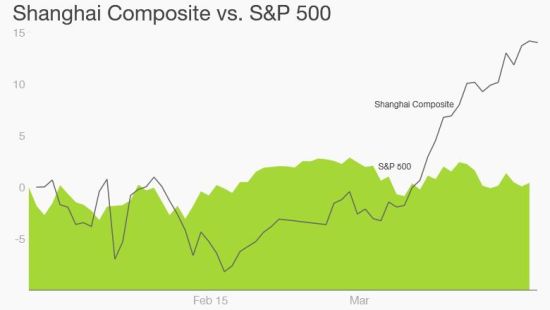双语:中国股市基准上涨成为全球最热股市
 全球最热股票市场在中国
全球最热股票市场在中国The Shenzhen Composite has surged a whopping 47% so far -- easily making it the world’s hottest market in 2015. China’s benchmark Shanghai Composite has also jumped a staggering 19%。到目前为止,深证综指已经飙升了47%,这使其轻而易举成为2015年全球最热的股市。而作为中国股市基准的上证综指,涨幅也达到了惊人的19%。
These giant market leaps are at odds with the broader Chinese economy -- GDP growth is clocking a slower pace and recent economic data points have been disappointing。
如此巨大的股市增长却与中国整体经济不相符,国内生产总值(GDP)增速放缓,近期经济数据也不太乐观。
But experts say that Chinese investors are betting the central government will be forced to take stimulus action to revive the sluggish economy -- a move that is expected to keep lifting stocks。
但专家分析,中国投资者断定中央政府会出台刺激措施来恢复萧条的经济,预计此举将继续提振股市。
"The equity market clearly believes the Chinese government will continue to take policy action to achieve its growth target, and poor growth statistics will lead to greater policy easing," wrote BNP Paribas equity strategist Manishi Raychaudhuri in a research note。
“股票市场显然认为中国政府会继续推行政策来实现经济增长目标,增长统计数据欠佳的表现会导致政策进一步放宽松。”法国巴黎银行(BNP Paribas)股市分析师雷查德哈里在一份研究报告中写到。
The country’s banks have also been told they can keep less cash in reserve, and benchmark interest rates have already been cut twice this year. Both moves have boosted stocks, according to Michael Liang of Foundation Asset Management. Economists predict the central bank will cut interest rates even further。
国内的银行也被告知要减少存款准备金,基准利率在今年已经下调了两次。邦德资产管理的迈克尔·梁认为这两项举措都会抬高股市。经济学家预测中央银行还会进一步下调利率。
Shenzhen, in particular, has been helped by its mix of listed companies -- the index is full of young tech, media and telecom firms. In Shanghai, large state-owned firms are the main attraction。
深圳股市主要依靠上市公司,其指数包括新兴的科技、传媒和通讯公司。上海股市则是一些国有大型企业。
Experts say China’s equities boom has also been fueled by renewed interest from retail investors。
专家指出,中国股市的繁荣也得益于散户投资者又恢复了投资兴趣。
Back in 2013, investors fled in droves after a series of fat-finger trading errors damaged confidence and raised questions over poor market regulation。
早在2013年,投资者大部分撤离的原因在于,一些列乌龙交易损害了市场信心,以及缺乏市场规范所造成的问题。
Now, many individual investors are taking their money out of alternative investments -- such as the flailing property sector -- and putting it back into stocks。
如今,散户投资者将资金从替代投资(比如摇摇欲坠的房地产市场)中撤离,转投股市。
About 170,000 new stock trading accounts are opened per business day in China, more than 10 times the average for last year, according to BNP。
巴黎银行指出,在中国,每个交易日有将近17万个新的股票交易账户开立,比去年平均水平多了10倍。
China’s massive stock rise is only lining the pockets of domestic investors -- foreign investment into Chinese stocks is still largely restricted. Trading volume through a program that launched last year allowing foreigners to invest in Shanghai has contributed a negligible fraction of daily turnover, Raychaudhuri said。
雷查德哈里介绍道,中国股市的大幅上涨只是让国内投资者受益,外国投资者想进入中国股市还是受到了很大的限制。去年启动的一项计划允许外国投资者能够在上海股市投资,但每天的交易量只占到了微不足道的一小部分。
But for Chinese investors, "the wall of money seems destined to continue flowing, at least in the near term," said Raychaudhuri。
雷查德哈里说,但对于中国投资者来说,大量资金还是会继续流入股市,至少在近期内是这样。
- 双语:法国严打“极瘦主义”网站2015-04-07 15:21
- 双语:研究人员找到治疗近视的有效的方法2015-04-07 14:56
- 一张图告诉你:画家最偏爱什么颜色?(双语)2015-04-07 12:04
- 双语:在法国煽动减肥者将被罚款(图)2015-04-07 11:00
- 双语:小狗被车撞埋葬后抵御死神奇迹生还2015-04-07 10:58

